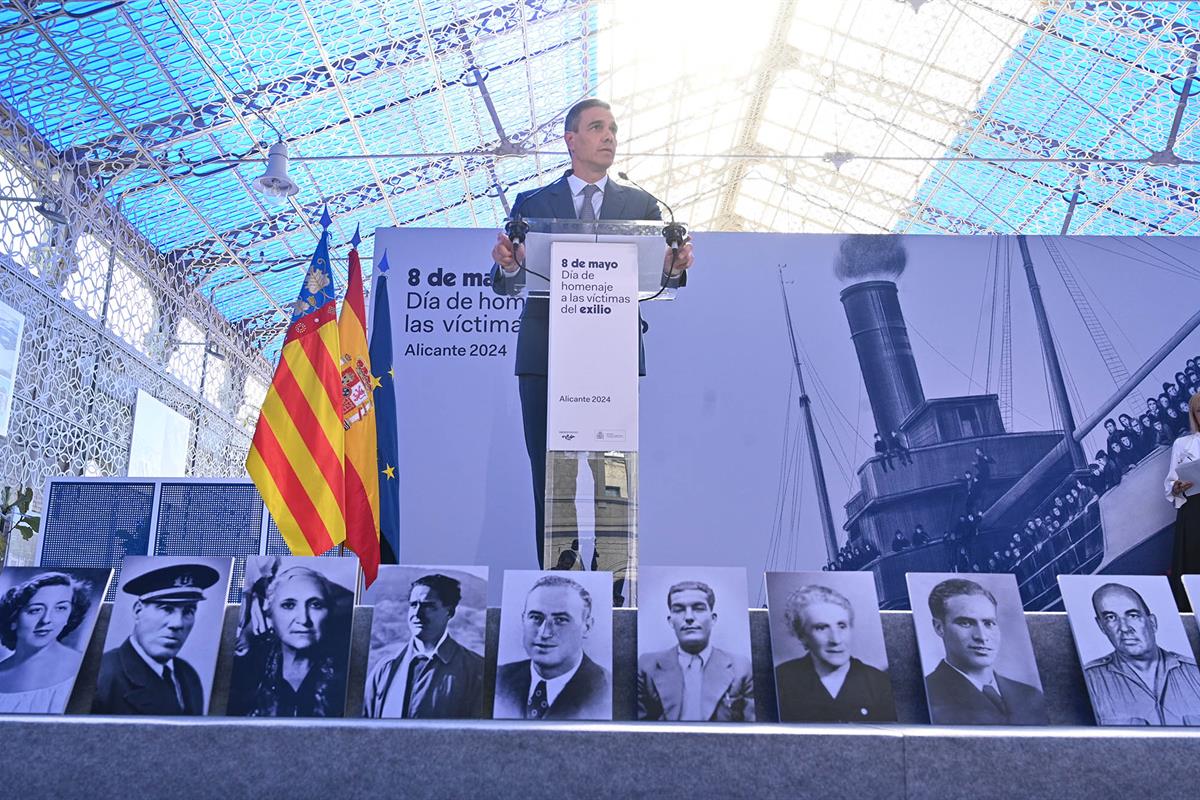Pedro Sánchez announces that he will use all the means of the rule of law to protect the democratic memory and the dignity of the victims of Francoism
President's News - 2024.5.8
Alicante
 Pool Moncloa / Borja Puig de la Bellacasa
Pool Moncloa / Borja Puig de la Bellacasa
The President of the Government of Spain, Pedro Sánchez, presided over the institutional act in Alicante on the Day of Tribute to the Victims of Exile, coinciding with the 85th anniversary of the Republican exile to North Africa and the departure of the 'Stanbrook' to Oran, the English cargo ship that saved the lives of nearly 3,000 Spaniards by taking them out of Spain in March 1939. There, Sánchez announced that his Government will "resort to all the means of the rule of law to protect the democratic memory and the dignity of the victims of Francoism".
The head of the Executive was accompanied by the Minister for Territorial Policy and Democratic Memory, Ángel Víctor Torres, and the Minister for Science, Innovation and Universities, Diana Morant, at this event to mark 8 May, the date established by the Law on Democratic Memory as "a day of remembrance and homage to the men and women who suffered exile as a result of the War and the Dictatorship", coinciding with the victory of the allied troops over the Nazis and Fascists, which ended the Second World War.
"Defending our memory is an obligation derived from our international commitments assumed by Spanish democracy", stressed the president of the Government of Spain, who denounced that "the anti-memory laws promoted by two political parties in our parliamentary arc in various communities, including the Valencian Community, are an attack on international law, an attack on our democracy and on the dignity of the victims".
In this sense, he pointed out that "as one of the UN rapporteurs has stated in their report on these rules agreed by the PP and Vox, you have to be a bad person not to heed the claim of the victims of what were human rights violations during the Spanish Civil War and Franco's dictatorship". "Because pain never goes away," he stressed.
"Equating victims with executioners is the opposite of concord" and "history should never be used as a political tactic", warned the president of the Government of Spain, because "this is not called concord, it is called historical revisionism". In this respect, he regretted that the right has not overcome the debate on calling a regime like Franco's a dictatorship. "We can no longer be complicit in this amnesia, remembering is an obligation", because "the memory of our past is democratic regeneration for our present", he said.
Finally, Sánchez stressed that "in these times of denialism and forgetfulness that are sweeping Europe and the world, those anonymous people who fight against tyranny and barbarism are an example of dignity and resistance", so that "on this day, today more than ever, we persist in our duty to remember and to provide truth, justice and reparation". "We can, we must, and we will continue to do so, to preserve their memory. For their dignity and for our dignity. Out of respect for the truth, and what is demanded by the defence of our democratic values, embodied in our Constitution and which we, with the law of democratic memory, once again claim here," he concluded.
Non official translation




